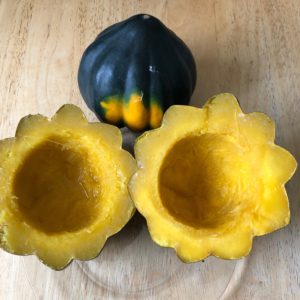 Happy New Year! Have you decided on your New Year resolution yet?
Happy New Year! Have you decided on your New Year resolution yet?
Mine is to continue experimenting with the plant foods and new ways of growing, preparing, and eating them.
A few days ago, I tried acorn squash for the first time, and it amazed me by its deliciousness.
I cut it across in half, removed the seeds, and steamed both halves at low temperature. It was soft, slightly sweet, and filling.
I washed, dried, and saved the seeds to plant them in spring.
Nutritionally, acorn squash is high in fiber (9 grams per 1 cup!), and many vitamins such as vitamin C, B1, B5, B6, pro-vitamin A (carotenes), and folate.
As for the minerals, it is a good source of calcium, magnesium, iron, potassium, and manganese, and has traces of zinc, selenium, and copper.
Acorn squash is low in fat, calories, and glycemic index, and a good source of omega-3 fats (76 mg per 1 cup). One cup of cooked acorn squash contains 2.3 g of protein, 0.3 g of fat, 30 g of carbohydrates, and 115 calories.
Stay tuned for more ideas on plant-based foods and beverages!
We wish you a happy, healthy, and fulfilling new year!
References:
National Nutrient Database for Standard Reference. (2016). United States Department of Agriculture. Agricultural Research Service. Retrieved from https://ndb.nal.usda.gov/ndb/foods/show/3186?fgcd=&manu=&lfacet=&format=&count=&max=50&offset=&sort=default&order=asc&qlookup=Acorn+squash&ds=&qt=&qp=&qa=&qn=&q=&ing=
SELF Nutrition Data. (2014). Squash, winter, acorn, cooked, baked, without salt. Retrieved from http://nutritiondata.self.com/facts/vegetables-and-vegetable-products/2645/2
